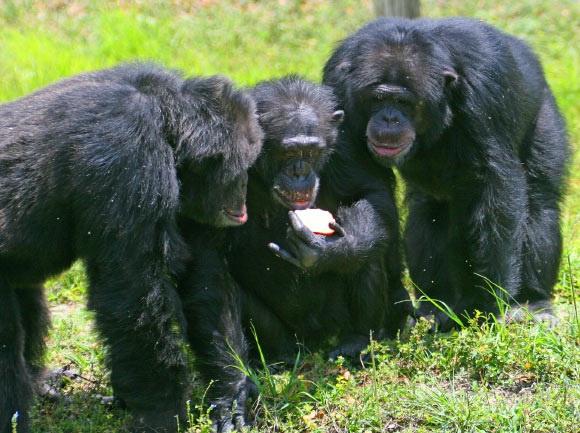According to a new study published in the Proceedings of the Royal Society B, humans’ cognitive capacity for cooking is shared by chimpanzees (Pan sp.). That includes the ability to comprehend the transformation of raw food that occurs when cooking, a preference for cooked food, and the ability to save their raw food and transport food over distance in anticipation of future opportunities to cook.

Chimpanzees at Miami Metrozoo. Image credit: Matthew Hoelscher / CC BY-SA 2.0.
Previous studies have hypothesized that cooking played a key role in human evolution by making food more digestible and enabling early humans to extract more energy from their diet.
In trying to understand the evolutionary origins of cooking, however, those studies largely focused on what is clearly a critical aspect of cooking: the control of fire.
The authors of the new study – Prof Felix Warneken of Harvard University and Dr Alexandra Rosati of Yale University – decided to approach the question from an alternate direction.
“People focus on the control of fire because that seems so salient, but even if you had a fire stick, several other insights are required before you can use it for cooking. Obviously, chimps can’t control fire, but we were trying to hypothesize about some of the other aspects of cooking, like the causal understanding that if you put this raw food on the fire it creates cooked food, or, at the extreme end of our study, the ability to plan,” Dr Rosati said.
“What’s particularly interesting about cooking is it’s something we all do, but it involves a number of capacities that, even without the context of cooking, are thought to be uniquely human. That’s why we wanted to study this in chimpanzees.”
To get at those questions, the scientists conducted a series of experiments using wild-born chimpanzees to test whether they were capable of making the mental leaps necessary for cooking.
Their first tests were dedicated to replicating the results of other studies: demonstrating that chimps preferred sweet potato that had been cooked to raw, and showing that the chimps were willing to pay a temporal cost, in the form of a minute-long wait, to obtain the preferred cooked food.
Subsequent tests were aimed at gauging whether chimps truly grasped the transformation from raw food to cooked, and whether they would spontaneously attempt to cook items.
To explore those questions, the team presented chimps with a cooking device that turned raw potato into cooked slices, and a control device that left it unchanged.
During the critical test, chimps saw raw sweet potato go into both, but had to choose one device before seeing its contents.
“Nearly every chimp reliably picked the cooking device. They quickly understood the transformation that was at work,” the scientists said. “It was the last experiment, however, that truly revealed chimps’ capacity for cooking.”
The chimps did not blindly try to cook everything, however. In another test, when chimps were given a piece of raw potato and a small piece of wood, they only put the potato in the cooker, suggesting they understood that only edible items could be cooked.
“That shows they don’t simply view this as a trading situation. They’re not interested in putting any random thing in the cooking device. You might expect them to put both in because they’d get twice as much, but they really don’t care about the wood piece,” Dr Rosati said.
In the final two experiments, the researchers focused on one of the most pressing current questions in animal cognition: whether animals are capable of planning for the future.
The chimps were willing to transport food for the opportunity to cook it. When given pieces of raw potato on one side of an enclosure, a number of chimps showed a willingness to carry them 4 meters to the cooking device on the opposite side.
“In some cases, they actually carried it in their mouth, and you could see that sometimes they would eat it, almost by accident. This was a hard problem, so they were less likely to put it in the cooking device if they had to carry it, but they did succeed about half the time, so they were able to do it,” Dr Rosati said.
To test whether chimps would save food in anticipation of cooking it later, in several tests chimpanzees were given food, but Prof Warneken appeared with the cooking device three minutes later.
“At the beginning, this is a very difficult inference. But later on, they understood that he’s going to come back, so if they can hold onto the food for that 3 minutes, they can transform it into cooked food. In the control condition, they got the same amount of food, but he never showed up. If they didn’t think they were going to be able to cook the food, they ate it,” Rosati said.
Several chimps were able to perform the task, and two saved nearly every piece of raw food they were given for it to be cooked later.
“While the study supports the notion that cooking behavior emerged early in human history, it may also suggest a new account for humans’ control of fire,” the scientists said.
_____
Felix Warneken & Alexandra G. Rosati. 2015. Cognitive capacities for cooking in chimpanzees. Proceedings of the Royal Society B, vol. 282, no. 1809; doi: 10.1098/rspb.2015.0229







